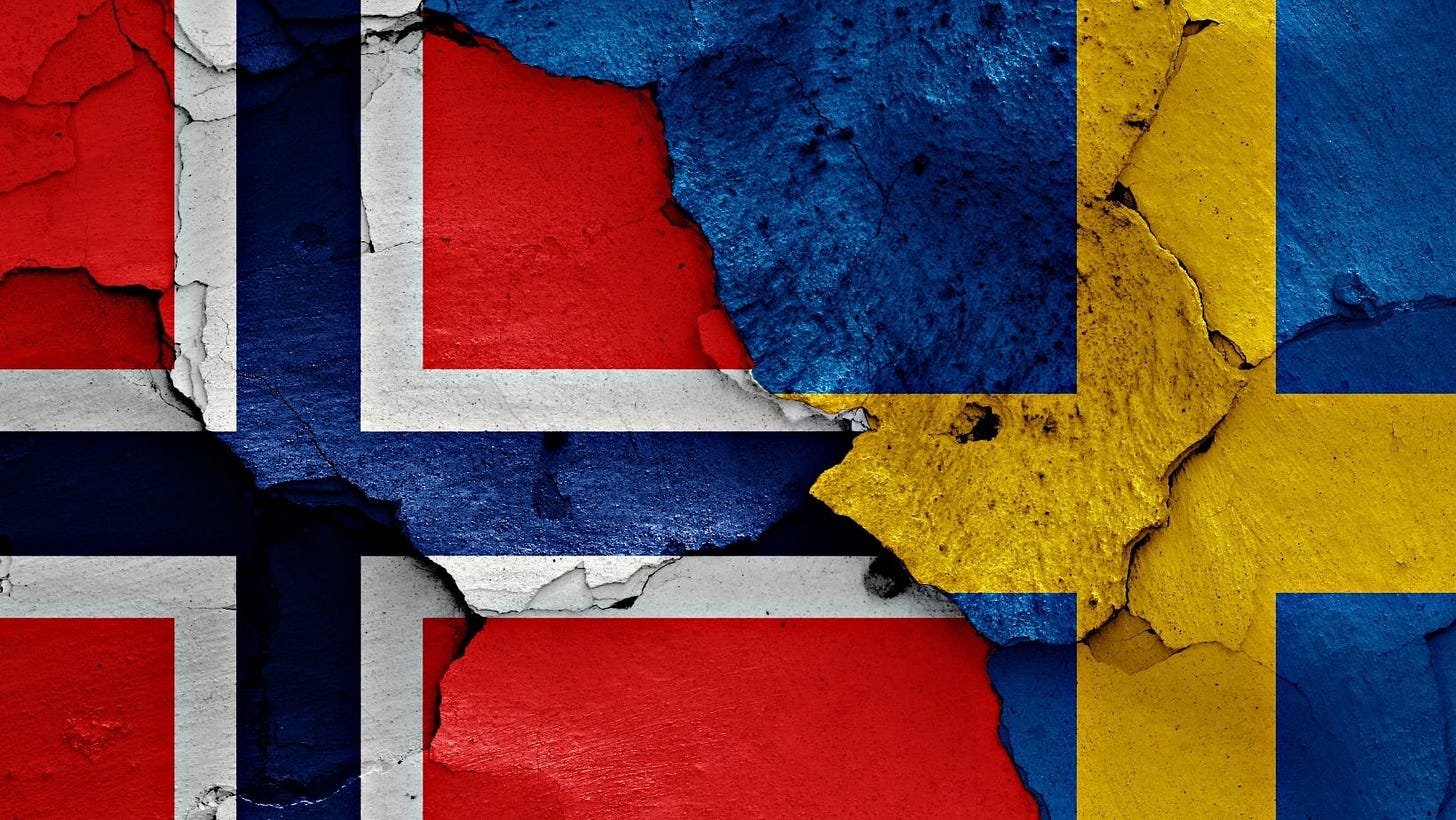
Anarcho-Capitalism Isn't Crazy, Just Ahead of Its Time
My opening statement for the Soho Forum
Thanks to everyone who watched the Brook-Caplan debate live on Monday! Great fun. The resolution was, “Anarcho-capitalism would definitely be a complete disaster for humanity.” Here’s my opening statement for the negative.
We Don’t Need Global Minarchy
“Anarcho-capitalism would definitely be a complete disaster for humanity.” My opponent, Yaron Brook, was the one who requested this strong resolution - not me. Still, if I was debating a normal economically illiterate human being before a normal economically illiterate audience, I’d be nervous. Fortunately, my opponent is a proponent of Ayn Rand’s Objectivism, and my audience is the Soho Forum. So we all agree on some basic principles of how markets work. Most notably:
Rational self-interest plus free competition plus reputation normally equals excellent results for both consumers and producers.
Since Ayn Rand and Yaron Brook embrace this principle, they are sanguine about what libertarians call “minarchy” - a society where government provides nothing except - to quote John Galt’s speech in Atlas Shrugged…
the police, to protect you from criminals; the army, to protect you from foreign invaders; and the courts, to protect your property and contracts from breach or fraud by others, to settle disputes by rational rules, according to objective law.
Now let’s imagine a glorious future when minarchy sweeps the world. Here is my question for Brook: When minarchy sweeps the world, will it be a “complete disaster for humanity” if multiple independent countries continue to exist? Yes or No?
If you answer Yes, you’re obviously wrong. Before 1945, you might have argued with some plausibility that world government is the only way to avert World War III. Now we know better. Having multiple independent countries isn’t a “complete disaster for humanity” even in the philosophically corrupt, horribly statist world of today. Indeed, there is now a long list of adjacent countries where the probability of violent conflict is near-zero: the U.S. and Canada; Norway and Sweden; even - students of history, drop your jaws - France and Germany!
So what? If you don’t answer Yes to “Will it be a complete disaster for humanity if multiple independent countries continue to exist?,” you’re stuck with No. And once you say No, the next obvious question is: Under minarchy, will it be a “complete disaster for humanity” if the world has a lot of small independent countries? If you say Yes, I’ll respond “Why?” If you say No, you’ve already accepted something that is functionally equivalent to one prominent version of anarcho-capitalism.
The version I have in mind: A society where businesses contractually acquire sizable tracts of land, then provide police, courts, and so on as part of a package deal. When conflict spills across their “borders,” they adjudicate their disputes much as the U.S. and Canada do today.
If you object, “The stronger business will just forcibly impose its will on the weaker business,” you’ve got to explain why the U.S. doesn’t just force its will on Canada. Which it obviously doesn’t. For a great many reasons.
Most notably: (a) Both sides morally oppose using military force to resolve marginal disputes; (b) Peaceful diplomacy works tolerably well; (c) The costs of bloodshed exceed the gains, even for the winner.
You could definitely argue that having lots of small countries in a minarchist world is somewhat inconvenient. Still, if you think minarchy would be a big improvement over the status quo, the net effect of moving from the world of today to a minarchist world with inconveniently small countries remains a major improvement. And a major improvement over the blatantly non-disastrous world of today is no disaster.
Can you really say that this version of anarcho-capitalism and minarchy with lots of small countries are equivalent? There is only one notable difference: Unlike governments, businesses under anarcho-capitalism have to acquire all their land through voluntary contracts with individual property-owners. No eminent domain, no equivocation between democracy and voluntarism. The difference is, in Nozick’s word, historical: Did the system arise in a morally exemplary way? Functionally, however, it doesn’t matter. Once established, this version of anarcho-capitalism and minarchy with lots of small countries work the same way.
“Regular” Anarcho-Capitalism
What about “regular” anarcho-capitalism, where people get personal subscriptions to police, courts, and so on, instead of buying a package deal from their real estate developer? Once you concede that lots of small minarchic countries can peacefully resolve their “cross-border” disputes, we can go further. The “borders” don’t have to be geographical; they can be organizational.
Right now, for example, if two customers of the same insurance company get into a car accident, the insurance company handles the dispute internally. If two customers of different insurance companies get into a car accident, the two insurance companies handle the dispute contractually. The economically illiterate will insist, “The companies will never agree; they’ll fight it out in court to the bitter end.” In the real world, however, the insurance industry has developed intricate adjudication systems that keep almost all their disputes out of the dysfunctional government courts.
“Regular” anarcho-capitalism would work the same way. If two parties to a dispute subscribe to the same protection agency, the agency handles the dispute internally. Otherwise, the two agencies handle the dispute contractually. The economically illiterate will insist, “The agencies will never agree; they’ll fight it out in the streets to the bitter end.” But in an established anarcho-capitalist society, this makes about as much sense as worrying that Sweden will become a dictatorship and invade Norway.
Which brings me to the Big Question of why Sweden won’t become a dictatorship and invade Norway. Because for most of its history, Sweden was a dictatorship and did repeatedly invade Norway.
Here’s my answer to this Big Question. Suppose that in the year 1200 AD, a Swede gave a speech advocating democracy and calling for perpetual peace with Norway. I submit that all the other Vikings would have laughed at his naivety. They would have laughed at the idea of democracy: “If the strongest jarl doesn’t win the election, he’ll just murder the winner and take over.” And they would have laughed at the idea of perpetual peace with Norway: “Whatever the Norwegians say, they’ll invade at the first sign of weakness.”
And in 1200 AD, the laughing Vikings would have been correct! When most people expect dictatorship and war, dictatorship and war are stable - and anyone who expects anything else seems crazy.
Today, however, imagine that the prime minister of Sweden gave a speech advocating dictatorship and calling for an invasion of Norway. Not only would the other Swedes laugh at him; they’d assume he was trying to make them laugh. If the prime minister persisted, however, he would be peacefully removed from power.
The lesson: In a society where most people expect democracy and peace, democracy and peace are stable - and anyone who expects anything else seems crazy.
So what? If you claim that anarcho-capitalism would be a complete disaster for humanity if were tried today, I agree. But the problem isn’t that anarcho-capitalism fails to provide good incentives, or that the system “logically” collapses in gang warfare. The problem is expectations. Moving from stable democracy to stable anarcho-capitalism is like moving from stable dictatorship to stable democracy. Shifting expectations is very hard; but the problem is the transition, not the destination.
Depressing? Kind of. The good news is that once we get to minarchy, the last step to anarcho-capitalism is miniscule. I’m going to end by showing you how miniscule.
The Miniscule Step from Minarchy to Anarchy
Under minarchy, government provides dispute resolution, rule formation, and enforcement. Many even claim that some or all of these functions must be a government monopoly. Yet none of these functions are monopolies even in the statist world of today. And most of what government does could easily be off-loaded to the private sector - especially when the private sector flourishes in the glorious light of laissez-faire.
Dispute resolution. Even today, you don’t need government to resolve most disputes. If you allow binding private arbitration, almost everyone with a contractual relation will eagerly opt out of the court system. If government courts declared, “We don’t handle disputes between people with contractual relations; you should have included an arbitration clause,” even more folks will opt out. You near the final frontier when government judges say, “You’re total strangers? Fine, we’ll appoint an arbitrator. Good bye.”
Rule formation. Even today, private arbitrators make their own rules. The main limit: No arbitration is truly binding, because the government can and will overrule you if displeased. Under minarchy, binding arbitration would have free rein, and government law-makers would have almost nothing left to do.
Enforcement. Even today, private arbitrators enforce their own rulings through reputation, ostracism, and bonding. If you don’t pay your bills, the main sanction is just a bad credit rating. Under minarchy, again, arbitrators - and everyone else - could use these sanctions freely. The final frontier is when government courts say, “You signed a binding arbitration contract that allows them to jail you? Then I have no jurisdiction.”
Almost everyone in this room is used to arguing for radical free-market policies. Almost everyone in this room knows the standard inventory of statist objections. Though I’m eager to answer your objections, I think you can answer most of them yourselves, using arguments you’ve already used a hundred times in other contexts. If you think adults should have the right to inject as much heroin as they want, and deny the results will be disastrous for humanity, you shouldn’t lose sleep over adults’ right to sign fully binding arbitration contracts.
In “The Nature of Government,” Ayn Rand called anarchy a “floating abstraction,” but then claimed that anarcho-capitalism was even worse:
One cannot call this theory a contradiction in terms, since it is obviously devoid of any understanding of the terms "competition" and "government." Nor can one call it a floating abstraction, since it is devoid of any contact with or reference to reality and cannot be concretized at all, not even roughly or approximately.
If you’ve read Atlas Shrugged, you know she’s wrong. Why? Because Ayn Rand herself “concretized” anarcho-capitalism with great clarity. Remember Galt’s Gulch - Rand’s “Utopia of Greed”? Here’s how super-banker Midas Mulligan explained it:
We are not a state here, not a society of any kind - we’re just a voluntary association of men held together by nothing but every man’s self-interest. I own the valley and I sell the land to others, when they want it. Judge Narragansett is to act as our arbiter, in case of disagreements. He hasn't had to be called upon as yet. They say that it's hard for men to agree. You'd be surprised how easy it is - when both parties hold as their moral absolute that neither exists for the sake of the other and that reason is their only means of trade. [emphasis mine]
Fortunately, Rand asks too much. You don’t need enthusiastic support to sustain a political system; even reluctant fatalism will do. Democracy becomes stable once most people expect it to be stable. Minarchy will be stable once most people expect it to be stable. Anarcho-capitalism will be stable once most people expect it to be stable. If and when they do, there will be no “disaster for humanity.” Just the Second Renaissance.



















Hey Bryan, what do you think about the Argentine presidential candidate Javier Milei? Prediction markets give him about a ~75% chance of winning. He's a half-Austrian half-orthodox economist and a self professed anarcho-capitalist. His style of politics is a sort of Rothbardian libertarian populism. He regularly characterizes politicians as evil and parasitic, as you have often done.
His policy positions and/or views include:
> Closing the central bank, liquidating it in US dollars, and eliminating the Argentine peso.
> A Gary Becker incentive-based economical approach to policing.
> Implementing education vouchers and eliminating state control of school syllabi.
> Implementing a more market-based government healthcare system.
> Deregulating the labor market and replacing firing restrictions and severance payments with a more flexible unemployment insurance system.
> General deregulation in all areas of the economy.
> Privatizing all state companies.
> Eliminating all price controls.
> Lowering taxes, public spending, and eliminating the deficit. Reforming the tax code so that it is less distorsive.
> Unilateral opening of the economy, moving towards absolute free trade.
> Free immigration.
> Legal kidney markets.
What do you think? Have you heard of him?
When Bryan talks about International Relations, it is literally the only time I'm not blown away by his thinking. For example, this is from the post:
"If you object, “The stronger business will just forcibly impose its will on the weaker business,” you’ve got to explain why the U.S. doesn’t just force its will on Canada. Which it obviously doesn’t. For a great many reasons."
Well, the US would absolutely impose it's will upon Canada if Canada's intentions deviated too far from what the US considered acceptable behavior. Do you really think the US would have allowed Canada to become a communist country in the 1950s? Of course not, just like the US intervened in various ways all through Central and South America to prevent exactly that. The US doesn't impose it's will violently against Canada because it doesn't need to.
Or pointing to the fact that France and Germany haven't fought since WW2. Few points. In the lives of countries and warfare 70-80 years isn't very long. Also it's not clear they wouldn't have fought if the giant behemoth that has been the US wasn't there to mediate disputes, just like a much larger and more powerful parent mediates disputes between siblings (in terms of power discrepancies, not saying those countries are children)
Over to others exactly what that means in the context of the article, but it's certainly not a slam dunk to say "all countries don't always use force against each other, therefore businesses won't."